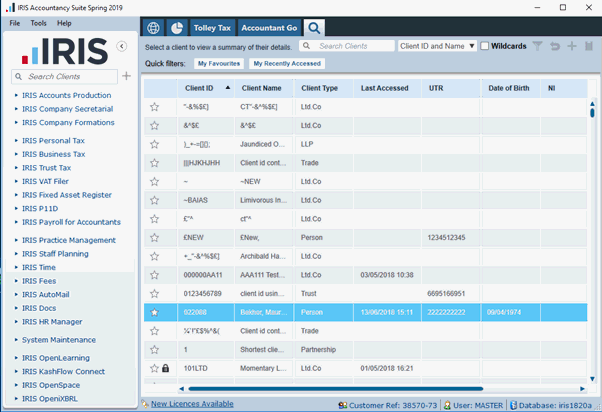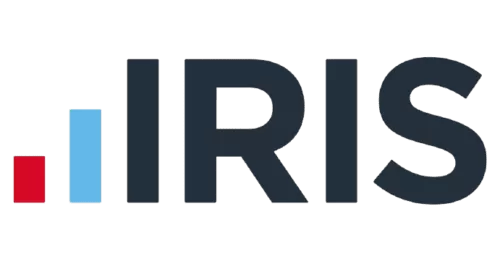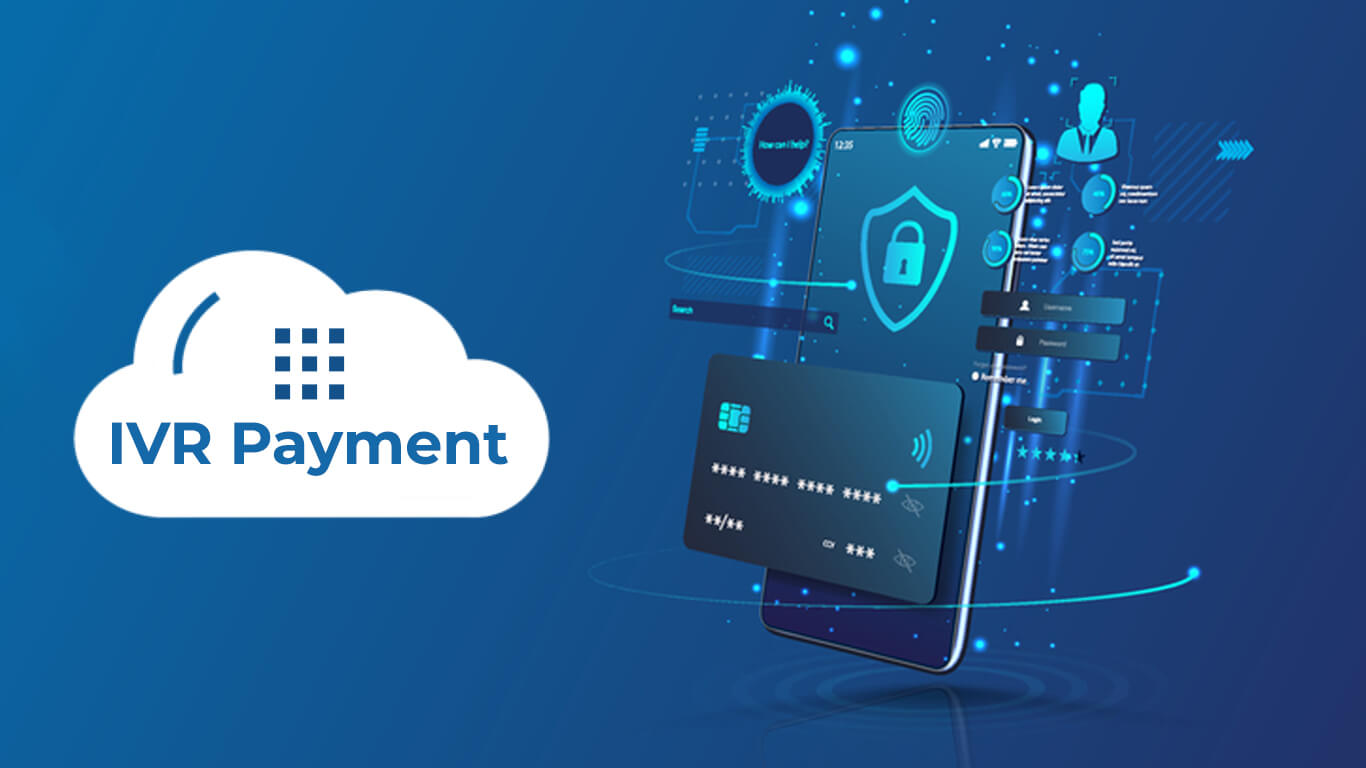Automate all your Accounts and finances in one platform. Avoid data leaks and enable consistent messaging. Get started with your IRIS Software Integration today.
Get in Touch
Learn more detail about CRM Integration with your phone system from our expert team.
Application Information:
- Manufacturer:
- IRIS Software Group Ltd
- CRM:
- Practice Manager
- Market/Sector:
- Accountancy
- Version:
- 11.4
Other Informations:
- Operation System:
- Windows
- Installation Option:
- Mandatory remote installation required.
- Product:
- Go Integrator sipdesk

Supported Features (related to latest supported release)
- Address book search:
- Caller details preview:
- Manual screen pop:
- Click to dial via Sipdesk Integrator:
- Additional features:
- Click to dial via Go Integrator:
- Auto Screen Pop:
- Manual call activity logging:
- Automatic call activity logging:
- Integration with Notes:
Get in Touch
Learn more detail about CRM Integration with your phone system from our expert team.
Description
Overview of IRIS Software 11.4 CRM Telephony Integration
IRIS Software 11.4 CRM Telephony Integration is a powerful solution that seamlessly integrates telephony capabilities with CRM systems. This integration allows organizations to centralize their communication processes, enabling them to efficiently manage customer interactions and enhance overall productivity. By combining the functionalities of telephony and CRM, businesses can streamline their workflows, reduce manual data entry, and improve customer service. With IRIS Software 11.4 CRM Telephony Integration, organizations can achieve a unified communication platform that brings together voice and data, leading to increased efficiency and improved customer satisfaction.
Key Features and Benefits
IRIS Software 11.4 CRM Telephony Integration offers a range of key features and benefits. Firstly, it enables seamless integration with popular CRM systems, such as Salesforce, Microsoft Dynamics, and Zoho CRM, among others. This ensures that all customer information is readily available during incoming and outgoing calls, providing agents with real-time data to personalize interactions and deliver exceptional customer experiences. Secondly, the solution offers advanced call routing and handling capabilities, allowing calls to be intelligently routed to the most appropriate agent based on predefined criteria such as skillset, language, or availability. This helps organizations optimize their call distribution and improve response times.
Additionally, IRIS Software 11.4 CRM Telephony Integration provides caller identification and screen pops, which display relevant customer details on the agent’s screen as soon as a call is received. This eliminates the need for manual searching and empowers agents to provide personalized and efficient service from the moment the call begins. Moreover, the solution offers real-time call analytics and reporting, enabling organizations to gain insights into call volumes, average call duration, wait times, and other key metrics. This analytics help in monitoring agent performance, identifying bottlenecks, and making data-driven decisions to optimize customer service processes.
Seamless Integration with CRM Systems
One of the standout features of IRIS Software 11.4 CRM Telephony Integration is its seamless integration with CRM systems. It offers out-of-the-box connectors and APIs that facilitate easy integration with popular CRM platforms, ensuring a smooth and hassle-free implementation process. This integration enables automatic synchronization of customer data, such as contact information, purchase history, and previous interactions, between the telephony system and the CRM.
As a result, agents have access to comprehensive customer profiles and can provide personalized, context-rich conversations. The seamless integration streamlines workflows by eliminating the need for manual data entry and reducing the chances of errors or data inconsistencies. By leveraging the power of combined telephony and CRM capabilities, organizations can enhance their overall customer relationship management processes and achieve greater operational efficiency.
Streamlining Communication Processes
IRIS Software 11.4 CRM Telephony Integration plays a vital role in streamlining communication processes within an organization. The solution offers advanced call routing and handling capabilities that intelligently distribute incoming calls to the most appropriate agent or department. By applying predefined rules and criteria, such as customer preferences, agent availability, or call priority, calls can be efficiently routed to ensure prompt and effective customer service. Additionally, the solution supports features like call queuing, call forwarding, and voicemail, further enhancing the call management process.
With caller identification and screen pops, agents receive real-time information about the caller, enabling them to greet customers by name, access their history, and provide personalized assistance right from the start of the conversation. This streamlined approach not only saves time but also creates a seamless customer experience, resulting in improved customer satisfaction and loyalty.
Enhancing Customer Interactions
IRIS Software 11.4 CRM Telephony Integration significantly enhances customer interactions by providing agents with valuable information and tools. With the caller identification feature, agents can see the caller’s name, contact details, and relevant CRM data, enabling them to personalize conversations and offer a more tailored experience. Screen pops further augment this capability by automatically displaying customer information as soon as a call is received, allowing agents to quickly access and update records in real time.
This seamless access to customer data empowers agents to provide accurate and relevant assistance, resolve queries efficiently, and nurture stronger customer relationships. Additionally, integration with CRM workflows enables agents to create and update tasks, appointments, or follow-up activities directly from the telephony interface, ensuring that customer interactions are seamlessly tracked and managed throughout the customer journey.
Advanced Call Routing and Handling
IRIS Software 11.4 CRM Telephony Integration offers advanced call routing and handling capabilities that optimize call distribution and improve overall call management efficiency. Intelligent call routing mechanisms route incoming calls based on predefined rules, such as IVR (Interactive Voice Response) selections, skill-based routing, or geographic criteria. This ensures that calls are directed to the most appropriate agent or department, maximizing the chances of first-call resolution and reducing call transfer rates.
The solution also supports automated call queuing, which allows callers to wait in a virtual queue until an agent becomes available. During peak periods, the system can play custom messages or music to keep callers engaged and informed about their position in the queue. Furthermore, the solution offers call-forwarding options, enabling calls to be routed to alternative agents or external numbers when needed. These advanced call-handling features ensure efficient call distribution, minimize wait times, and enhance overall customer satisfaction.
Caller Identification and Screen Pops
IRIS Software 11.4 CRM Telephony Integration includes powerful caller identification and screen pop functionality. When an incoming call is received, the solution automatically identifies the caller based on the incoming phone number and searches the CRM database for a matching record. Once a match is found, relevant customer information such as name, account details, purchase history, and previous interactions are displayed in a screen pop on the agent’s interface.
This instant access to customer data eliminates the need for agents to manually search for customer information, enabling them to provide more personalized and efficient service. Agents can quickly reference previous interactions, understand the customer’s needs, and tailor their approach accordingly. This seamless integration of caller identification and screen pops enhances the customer experience, as it allows agents to deliver a more personalized and informed interaction from the very beginning of the call.
Real-time Call Analytics and Reporting
IRIS Software 11.4 CRM Telephony Integration provides robust real-time call analytics and reporting capabilities. Organizations can gain valuable insights into call volumes, average call duration, wait times, and other key metrics. These analytics enable managers to monitor agent performance, track service levels, and identify areas for improvement. By analyzing call patterns and trends, organizations can make data-driven decisions to optimize their customer service processes, allocate resources effectively, and enhance overall operational efficiency.
Additionally, the solution offers customizable reports and dashboards that provide a comprehensive view of call metrics and performance indicators. This data empowers organizations to measure the effectiveness of their telephony integration, identify bottlenecks, and implement strategies to improve customer service and satisfaction. With real-time call analytics and reporting, organizations can continually refine their operations and ensure they are meeting and exceeding customer expectations.
Integration with CRM Data and Workflows
IRIS Software 11.4 CRM Telephony Integration offers seamless integration with CRM data and workflows, enabling organizations to leverage the full power of their CRM systems. The solution synchronizes telephony activities with CRM records, ensuring that all call details, notes, and call outcomes are automatically logged within the CRM platform. This integration allows for a comprehensive view of customer interactions, empowering organizations to track and analyze the entire customer journey.
In addition, the integration enables the automation of CRM workflows based on telephony events. For example, after a call is completed, the system can automatically trigger follow-up tasks, send email notifications, or update customer records based on predefined rules and workflows. This integration of telephony and CRM workflows streamlines business processes, reduces manual effort, and enhances productivity.
Improved Productivity and Efficiency
One of the significant benefits of IRIS Software 11.4 CRM Telephony Integration is the improvement in productivity and efficiency it brings to organizations. By consolidating telephony and CRM functionalities into a single, unified interface, agents can handle customer interactions more efficiently. They no longer need to switch between multiple systems or perform manual data entry, as relevant customer information is automatically displayed during calls.
This streamlined workflow enables agents to focus more on delivering exceptional customer service rather than administrative tasks. The solution also provides features like click-to-dial, which allows agents to initiate calls directly from CRM records, saving time and eliminating misdials. With advanced call routing and handling capabilities, calls are efficiently distributed, reducing wait times and enabling faster issue resolution. Overall, IRIS Software 11.4 CRM Telephony Integration enhances workforce productivity, reduces operational costs, and improves customer satisfaction.
Customization and Configuration Options
IRIS Software 11.4 CRM Telephony Integration offers a range of customization and configuration options to cater to the specific needs of organizations. Administrators can configure the solution according to their business requirements, defining call routing rules, screen pop behaviors, and integration settings. Customizable IVR menus can be created to guide callers to the appropriate departments or agents. The solution also supports personalized greetings and message prompts to provide a branded and tailored experience to callers.
Additionally, organizations can customize the reporting and analytics features to focus on the metrics that matter most to them. With these customization options, businesses can align the telephony integration with their unique processes and branding, ensuring a seamless and cohesive experience for both agents and customers.
Compatibility and Integration with Existing Infrastructure
IRIS Software 11.4 CRM Telephony Integration is designed to be compatible with a wide range of existing telephony infrastructure and CRM systems. It offers flexibility and interoperability, allowing organizations to integrate with their preferred telephony providers and CRM platforms seamlessly. Whether it’s an on-premises PBX system or a cloud-based telephony solution, the integration can be tailored to fit the specific environment.
The solution supports standard telephony protocols and APIs, ensuring smooth integration and minimal disruption to existing systems. Moreover, it provides comprehensive documentation and technical support to assist organizations in the integration process. By leveraging the compatibility and integration capabilities of IRIS Software 11.4 CRM Telephony Integration, organizations can maximize their existing investments and extend the value of their telephony and CRM infrastructure.
Security and Data Privacy Considerations
IRIS Software 11.4 CRM Telephony Integration prioritizes the security and data privacy of organizations’ sensitive information. The solution employs robust security measures to safeguard communication channels and customer data. It supports encryption protocols to ensure secure transmission of voice and data, protecting against unauthorized access or interception.
Additionally, the solution adheres to industry best practices and compliance standards to maintain data privacy, such as GDPR (General Data Protection Regulation) and CCPA (California Consumer Privacy Act). Organizations can have peace of mind knowing that their customer data is handled and stored securely within the CRM system. By maintaining a high level of security and data privacy, IRIS Software 11.4 CRM Telephony Integration enables organizations to build trust with their customers and meet regulatory requirements.
Implementation and Deployment Process
Implementing IRIS Software 11.4 CRM Telephony Integration is a streamlined and efficient process. The solution offers comprehensive implementation support, including pre-configured connectors and APIs for popular CRM systems, as well as detailed documentation and technical resources. Organizations can work closely with the IRIS Software team or certified implementation partners to tailor the integration to their specific requirements.
The deployment process typically involves assessing the existing telephony infrastructure, configuring the integration settings, testing the connectivity, and training the agents on the new functionalities. With proper planning and support, organizations can achieve a smooth and successful deployment of telephony integration. Post-deployment, ongoing technical support, and maintenance ensure that organizations can maximize the benefits of the integration and address any potential issues promptly.
Training and Support Services
IRIS Software 11.4 CRM Telephony Integration offers comprehensive training and support services to ensure organizations can make the most of the solution. Training programs are available to help agents and administrators familiarize themselves with the integration, its features, and best practices for optimizing customer interactions. These training sessions can be conducted onsite or remotely, depending on the organization’s needs.
Additionally, the solution provides dedicated technical support to address any issues or queries that may arise during implementation or ongoing usage. The support team is available to assist with troubleshooting, configuration assistance, and guidance on maximizing the benefits of the integration. With training and support services, organizations can empower their teams to effectively utilize telephony integration and deliver exceptional customer service.
Success Stories and Use Cases
IRIS Software 11.4 CRM Telephony Integration has a track record of success across various industries and organizations. Numerous success stories and use cases demonstrate the value and benefits it brings to businesses. For example, a telecommunications company implemented the integration and witnessed a significant reduction in call transfer rates, improved customer satisfaction scores, and increased agent productivity.
A healthcare provider implemented the solution and achieved streamlined appointment scheduling, reduced hold times for patients, and improved call routing to specialized departments. These success stories highlight the versatility and effectiveness of telephony integration across different sectors. By exploring these use cases, organizations can gain insights into how the integration can be tailored to their specific needs and drive positive outcomes.
Future Roadmap and Upcoming Features
IRIS Software 11.4 CRM Telephony Integration is continuously evolving to meet the changing needs of businesses and advancements in technology. The solution provider has a robust roadmap for future updates and enhancements, ensuring that organizations can stay ahead in their telephony integration capabilities. These updates may include additional CRM system integrations, expanded reporting and analytics functionalities, enhanced customization options, and integration with emerging communication channels. By keeping an eye on the future roadmap of the solution, organizations can plan for upcoming features and advancements that will further optimize their telephony integration and enhance their customer service strategies.
Pricing and Licensing Options
Pricing and licensing options for IRIS Software 11.4 CRM Telephony Integration vary based on factors such as the size of the organization, the number of users, and specific customization requirements. It is recommended to reach out to the solution provider or authorized resellers to discuss pricing details and obtain a tailored quote based on the organization’s needs. Flexible licensing models, such as subscription-based or perpetual licenses, may be available to accommodate different budgetary preferences.
Additionally, organizations should inquire about any additional costs related to implementation, training, or ongoing technical support to ensure a comprehensive understanding of the total investment required. By obtaining clarity on pricing and licensing options, organizations can make informed decisions and evaluate the return on investment that the telephony integration offers.
System Requirements and Technical Specifications
IRIS Software 11.4 CRM Telephony Integration has specific system requirements and technical specifications that organizations should consider. These requirements typically include compatibility with specific operating systems, telephony infrastructure, and CRM system versions. It is essential to review the system requirements and ensure that the organization’s existing infrastructure meets the necessary specifications for seamless integration and optimal performance. Additionally, organizations should consider factors such as network bandwidth, server capacity, and security protocols to support the integration effectively. By assessing the system requirements and technical specifications, organizations can ensure a smooth implementation and minimize any potential compatibility issues or performance challenges.
Conclusion and Next Steps
In conclusion, IRIS Software 11.4 CRM Telephony Integration offers a comprehensive solution for seamlessly integrating telephony capabilities with CRM systems. By leveraging this integration, organizations can streamline communication processes, enhance customer interactions, and improve productivity and efficiency. The solution provides features such as caller identification, screen pops, advanced call routing, and real-time analytics to empower agents and deliver exceptional customer service.
With customization options, compatibility with existing infrastructure, and strong support services, organizations can tailor the integration to their specific needs and drive positive business outcomes. To take the next steps toward implementing IRIS Software 11.4 CRM Telephony Integration, organizations should reach out to the solution provider or authorized resellers for further discussions, demonstrations, and evaluations to determine how the integration can best serve their requirements.
FAQs
What is IRIS Software 11.4 CRM Telephony Integration?
IRIS Software 11.4 CRM Telephony Integration is a solution that seamlessly integrates telephony capabilities with CRM systems, enabling organizations to streamline communication processes and enhance customer interactions.
Which CRM systems does IRIS Software 11.4 CRM Telephony Integration support?
IRIS Software 11.4 CRM Telephony Integration supports popular CRM systems such as Salesforce, Microsoft Dynamics, Zoho CRM, and more. It provides out-of-the-box connectors and APIs for easy integration with these platforms.
How does IRIS Software 11.4 CRM Telephony Integration enhance customer interactions?
The integration enables agents to have real-time access to customer data during incoming and outgoing calls, allowing for personalized interactions. Features like caller identification, screen pops, and CRM data synchronization empower agents to provide efficient and tailored customer service.
Can IRIS Software 11.4 CRM Telephony Integration route calls to the most appropriate agent?
Yes, the solution offers advanced call routing and handling capabilities. Calls can be intelligently routed based on predefined criteria such as skillset, language, or availability, ensuring they reach the most suitable agent for efficient issue resolution.
How does IRIS Software 11.4 CRM Telephony Integration help with call analytics and reporting?
The integration provides real-time call analytics and reporting, allowing organizations to gain insights into call volumes, average call duration, wait times, and other key metrics. This helps in monitoring agent performance, identifying areas for improvement, and making data-driven decisions to optimize customer service processes.
Can IRIS Software 11.4 CRM Telephony Integration be customized to fit specific business requirements?
Yes, the solution offers customization and configuration options. Administrators can define call routing rules, screen pop behaviors, and integration settings to align with the organization’s specific needs and workflows.
Is IRIS Software 11.4 CRM Telephony Integration compatible with existing telephony infrastructure?
Yes, the integration is designed to be compatible with a wide range of existing telephony infrastructure, including both on-premises and cloud-based systems. It supports standard telephony protocols and APIs for smooth integration.
What kind of training and support services are provided for IRIS Software 11.4 CRM Telephony Integration?
The solution offers comprehensive training programs to help agents and administrators familiarize themselves with the integration. Dedicated technical support is also provided to address any implementation or usage issues that may arise.
Are there any security measures in place to protect customer data?
Yes, IRIS Software 11.4 CRM Telephony Integration prioritizes the security and data privacy of customer information. It supports encryption protocols for secure transmission and adheres to industry best practices and compliance standards to maintain data privacy.
How can organizations get started with IRIS Software 11.4 CRM Telephony Integration?
To get started, organizations can reach out to the solution provider or authorized resellers for further discussions, demonstrations, and evaluations. This will help determine how the integration can best serve their specific requirements and initiate the implementation process.




